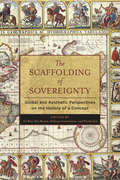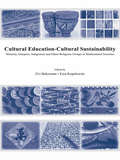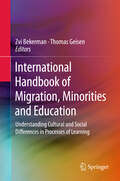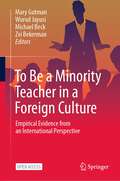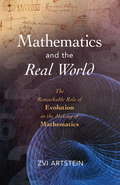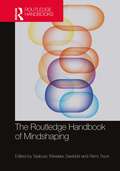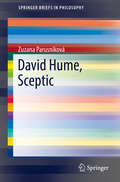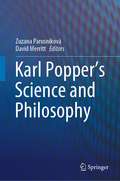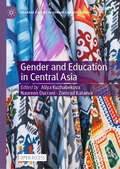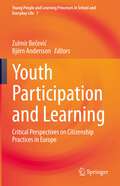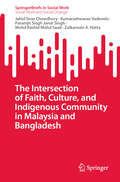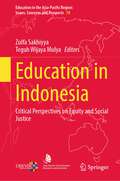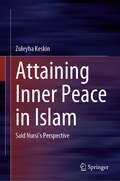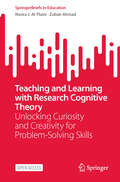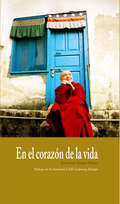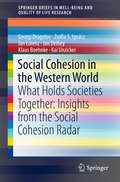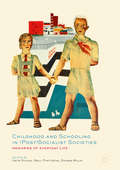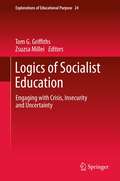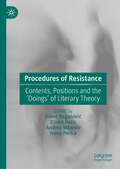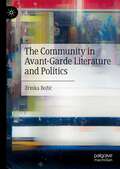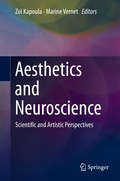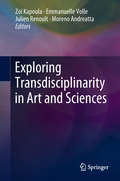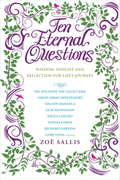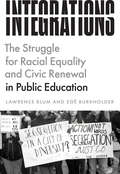- Table View
- List View
The Scaffolding of Sovereignty: Global and Aesthetic Perspectives on the History of a Concept (Columbia Studies in Political Thought / Political History)
by Stefanos Geroulanos Zvi Ben-Dor Benite Nicole JerrWhat is sovereignty? Often taken for granted or seen as the ideology of European states vying for supremacy and conquest, the concept of sovereignty remains underexamined both in the history of its practices and in its aesthetic and intellectual underpinnings. Using global intellectual history as a bridge between approaches, periods, and areas, The Scaffolding of Sovereignty deploys a comparative and theoretically rich conception of sovereignty to reconsider the different schemes on which it has been based or renewed, the public stages on which it is erected or destroyed, and the images and ideas on which it rests.The essays in The Scaffolding of Sovereignty reveal that sovereignty has always been supported, complemented, and enforced by a complex aesthetic and intellectual scaffolding. This collection takes a multidisciplinary approach to investigating the concept on a global scale, ranging from an account of a Manchu emperor building a mosque to a discussion of the continuing power of Lenin’s corpse, from an analysis of the death of kings in classical Greek tragedy to an exploration of the imagery of “the people” in the Age of Revolutions. Across seventeen chapters that closely study specific historical regimes and conflicts, the book’s contributors examine intersections of authority, power, theatricality, science and medicine, jurisdiction, rulership, human rights, scholarship, religious and popular ideas, and international legal thought that support or undermine different instances of sovereign power and its representations.
Cultural Education - Cultural Sustainability: Minority, Diaspora, Indigenous and Ethno-Religious Groups in Multicultural Societies
by Zvi Bekerman Ezra KopelowitzThis volume is a path-breaking contribution to the study of efforts of diaspora, indigenous, and minority groups, broadly defined, to use education (formal and informal) to sustain cultural continuity while grappling with the influences and demands of wider globalizing, nationalizing, or other homogenizing and assimilatory forces. Particular attention is given to groups that use educational elements other than second-language teaching alone in programs to sustain their particular cultural traditions. The focus of the book on cultural sustainability changes the nature of questions posed in multicultural education from those that address the opening of boundaries to issues of preserving boundaries in an open yet sustainable way. As forced and elective immigration trends are changing the composition of societies and the educational systems within them -- bringing a rich diversity of cultural experience to the teaching/learning process -- diaspora, indigenous, and minority groups are looking more and more for ways to sustain their cultures in the context of wider socio-political influences. This volume is a first opportunity to consider critically multicultural efforts in dialogue with educational options that are culturally particularistic but at the same time tolerant. Academics will find this an excellent reference book. Practitioners will draw inspiration in learning of others’ efforts to sustain cultures, and will engage in critical reflection on their own work vis-à-vis that of others. Teachers will realize they do not stand alone in their educational efforts and will uncover new strategies and methodologies through which to approach their work.
International Handbook of Migration, Minorities and Education
by Zvi Bekerman Thomas GeisenMigrants and minorities are always at risk of being caught in essentialized cultural definitions and being denied the right to express their cultural preferences because they are perceived as threats to social cohesion. Migrants and minorities respond to these difficulties in multiple ways -- as active agents in the pedagogical, political, social, and scientific processes that position them in this or that cultural sphere. On the one hand, they reject ascribed cultural attributes while striving towards integration in a variety of social spheres, e.g. school and workplace, in order to achieve social mobility. On the other hand, they articulate demands for cultural self-determination. This discursive duality is met with suspicion by the majority culture. For societies with high levels of migration or with substantial minority cultures, questions related to the meaning of cultural heterogeneity and the social and cultural limits of learning and communication (e.g. migration education or critical multiculturalism) are very important. It is precisely here where the chances for new beginnings and new trials become of great importance for educational theorizing, which urgently needs to find answers to current questions about individual freedom, community/cultural affiliations, and social and democratic cohesion. Answers to these questions must account for both 'political' and 'learning' perspectives at the macro, mezzo, and micro contextual levels. The contributions of this edited volume enhance the knowledge in the field of migrant/minority education, with a special emphasis on the meaning of culture and social learning for educational processes.
To Be a Minority Teacher in a Foreign Culture: Empirical Evidence from an International Perspective
by Michael Beck Zvi Bekerman Mary Gutman Wurud JayusiThis open access book offers in depth knowledge on the challenges and opportunities offered by the inclusion of minority teachers in mainstream educational settings from an international perspective. It aims to be a unique and important contribution for scholars, policy-makers, and practitioners considering the complexities brought about by global trends into national/local educational systems and settings. It will also serve to guide future research, policy, and practice in this important field of inquiry. The work will contribute answers to questions such as: How do immigrant/minority teachers experience their work in mainstream educational settings?; How do mainstream shareholders experience the inclusion of immigrant/minority teachers in mainstream educational settings?; What is the effect of the successful (and/or unsuccessful) integration of minority teachers and teacher educators into mainstream education settings?.
Mathematics and the Real World
by Zvi ArtsteinIn this accessible and illuminating study of how the science of mathematics developed, a veteran math researcher and educator looks at the ways in which our evolutionary makeup is both a help and a hindrance to the study of math.Artstein chronicles the discovery of important mathematical connections between mathematics and the real world from ancient times to the present. The author then describes some of the contemporary applications of mathematics--in probability theory, in the study of human behavior, and in combination with computers, which give mathematics unprecedented power.The author concludes with an insightful discussion of why mathematics, for most people, is so frustrating. He argues that the rigorous logical structure of math goes against the grain of our predisposed ways of thinking as shaped by evolution, presumably because the talent needed to cope with logical mathematics gave the human race as a whole no evolutionary advantage. With this in mind, he offers ways to overcome these innate impediments in the teaching of math.
The Routledge Handbook of Mindshaping (Routledge Handbooks in Philosophy)
by Daniel Kelly Wynn C. Stirling Michelle Maiese Jaroslav Peregrin Don Ross Sam Wilkinson Fredrik Stjernberg Shannon Spaulding Julian Kiverstein Ladislav Koreň Eric Funkhouser Ian Apperly Marc Slors Kristina Musholt Alessandra Tanesini Christopher Jude McCarroll Julia Wolf Fernando Martínez-Manrique Tadeusz Wiesław Zawidzki Rémi Tison Nikola Andonovski Virginia Ballesteros Leda Berio Devin Sanchez Curry Laura Danón Léon De Bruin John Dorsch Matej Drobňák Víctor Fernández-Castro Colum Finnegan Simon Fitzpatrick Marianna B. Ganapini Adam Gies Trip Glazer James Grayot J. P. Grodniewicz Núñez de Prado-Gordillo, Miguel Lucy Osler Dennis Papadopoulos Daniel Pérez-Zapata Uwe Peters Enrico Petracca Zuzanna Rucińska Ayana Samuel Derek Strijbos Brandon Tinklenberg Mason Westfall Evan WestraOf all species, human beings are uniquely capable of coordinating on long-term, large-scale cooperative projects with unfamiliar and genetically unrelated others. According to the mindshaping hypothesis, this relies on mechanisms and practices like imitation, pedagogy, normative cognition, and narrative self-constitution, which shape us into expert coordinators, without requiring time consuming and epistemically fraught attempts to read each other’s minds. Mindshaping has been applied to many areas of inquiry, including game theory, shared agency, communication, the ontogeny of human cognition, the dissemination of scientific knowledge in popular media, mental illness, and the influence of social media technologies.The Routledge Handbook of Mindshaping is the first volume of its kind. Comprising 37 chapters by an international team of leading scholars, this Handbook is organised into seven sections: Mindshaping and coordination Mindshaping and cognitive psychology Mindshaping and normativity Mindshaping and epistemology Social and political dimensions of mindshaping Nonhuman mindshaping Mindshaping applied Within these sections, key topics are addressed, including game theory, social signalling and shared agency, folk psychology, the emotions, language acquisition and memory, stereotyping and consciousness-raising, moral agency, self-knowledge, rationality, epistemic norms, primate sociality, human-elephant relations, artificial intelligence, mental illness and neurodiversity, aesthetic expression, and politics.An outstanding survey of a vibrant and emerging field, The Routledge Handbook of Mindshaping will be of great interest to those studying and researching philosophy of psychology, philosophy of cognitive science, philosophy of mind, and applied epistemology. It will also be of interest to those in related disciplines such as cognitive psychology, sociology, and anthropology.
David Hume, Sceptic (SpringerBriefs in Philosophy)
by Zuzana ParusnikováThis book studies Hume’s scepticism and its roots, context, and role in the philosopher’s life. It relates how Hume wrote his philosophy in a time of tumult, as the millennia-old metaphysical tradition that placed humans and their cognitive abilities in an ontological framework collapsed and gave way to one that placed the autonomy of the individual in its center. It then discusses the birth of modernity that Descartes inaugurated and Kant completed with his Copernican revolution that moved philosophy from Being to the Self. It shows how modernity gave rise to a new kind of scepticism, involving doubt not just about the adequacy of our knowledge but about the very existence of a world independent of the self. The book then examines how Hume faced the sceptical implications and how his empiricism added yet another sceptical theme with the main question being how argument can legitimize key concepts of human understanding instinctively used in making sense of our perceptions. Placing it firmly in a historical context, the book shows how Hume was influenced by Pyrrhonian scepticism and how this becomes clear in Hume’s acceptance of the weakness of reason and in his emphasis on the practical role of philosophy. As the book argues, rather than serving as the foundation of science, in Hume’s hand, philosophy became a guide to a joyful, happy life, to a documentary of common life and to moderately educated, entertaining conversation. This way Hume stands in strong opposition to the (early) modern mainstream.
Karl Popper's Science and Philosophy
by Zuzana Parusniková David MerrittOf all philosophers of the 20th century, few built more bridges between academic disciplines than Karl Popper. He contributed to a wide variety of fields in addition to the epistemology and the theory of scientific method for which he is best known. This book illustrates and evaluates the impact, both substantive and methodological, that Popper has had in the natural and mathematical sciences. The topics selected include quantum mechanics, evolutionary biology, cosmology, mathematical logic, statistics, and cognitive science. The approach is multidisciplinary, opening a dialogue across scientific disciplines and between scientists and philosophers.
Gender and Education in Central Asia (Palgrave Studies in Gender and Education)
by Naureen Durrani Aliya Kuzhabekova Zumrad KataevaThis open access book brings together established and emerging scholars to explore policies, statistical trends and representative research on gender equity across post-Soviet Central Asia. The book provides an overview of policy development in the promotion of gender equity, a comparative summary of changes in gender equity indicators at various levels of education, and examples of current research on an array of issues relating to gender equity across the region. The chapters present a broad picture which will be relevant to scholars of educational reform, comparative education policy, international development and gender issues.
Youth Participation and Learning: Critical Perspectives on Citizenship Practices in Europe (Young People and Learning Processes in School and Everyday Life #7)
by Björn Andersson Zulmir BečevićThis book contributes to the studies on learning processes occurring outside “traditional” socialization settings such as family and school, by analysing civic and political participation and learning experiences. In this perspective, the book delves into the connections between the concepts of learning and participation and, in various ways and from different perspectives, critically interrogates learning and participation as interrelated phenomena, with the aim of revealing complexities implicated in pathways to adulthood. Being interdisciplinary in its nature (contributors come from disciplinary backgrounds such as educational sciences, child and youth studies, social work, sociology and political science), the volume provides an up-to date analysis of contemporary issues connected to youth participation and learning. The work taps into central areas of everyday life of young people and youth meaning-making and generates and presents qualitative knowledge about what it means to be young in Europe today.
The Intersection of Faith, Culture, and Indigenous Community in Malaysia and Bangladesh (SpringerBriefs in Social Work)
by Jahid Siraz Chowdhury Mohd Rashid Mohd Saad Kumarashwaran Vadevelu Paramjit Singh Jamir Singh Zulkarnain A. HattaThis book is a comprehensive study of the intersection of religion, Indigenous culture, and community life, featuring an in-depth examination of the Orang Asli in Malaysia and the Santals in Bangladesh that aims for a socially inclusive, harmonious, and peaceful society. It dives into the impact of conversion on Indigenous identities, employing extensive ethnographic and phenomenological methodologies. The authors explore the conversion process attentively, revealing hidden isolation. This compact volume offers intriguing insights into Southeast and South Asia's rich tapestry, including nuance to discussions concerning religious pluralism, human rights, and the pursuit of social justice. Readers gain a better understanding of varied religious communities and Indigenous perspectives in order to promote a more inclusive and fair society. In the book, the authors provide real-life experiences, extensive analysis, and practical solutions for Indigenous populations in Malaysia and Bangladesh. They blend together thoughts and narratives, encompassing sociopolitical and historical themes. With visuals, case studies, and varied views, the volume builds respect for global variety while driving societal inclusion with the spirit of the sustainable development goals (SDGs). The Intersection of Faith, Culture, and Indigenous Community in Malaysia and Bangladesh addresses pressing social justice and human rights issues, pushing for rights-based society and diversity, while balancing academic rigor and accessibility. The book is intended for scholars and researchers interested in Indigenous peoples, religious conversion, social justice, and human rights. It offers detailed insights into the conversion experiences of Malaysian Orang Asli and Bangladeshi Santal groups, and provides commentary on civil freedoms following conversion and reveals complex views of these communities, making the volume useful for scholars researching intersectionality in religious conversions and the dynamics surrounding Indigenous populations. Policymakers in Malaysia, Bangladesh, and other Asian countries dealing with comparable concerns with converted Indigenous people might benefit from the book's evidence-based insights and challenges, promoting more inclusive and culturally sensitive policies and urging Malaysian and Bangladeshi governments to recognize conversion-related issues.
Education in Indonesia: Critical Perspectives on Equity and Social Justice (Education in the Asia-Pacific Region: Issues, Concerns and Prospects #70)
by Zulfa Sakhiyya Teguh Wijaya MulyaThis book offers a critical analysis on Indonesian education by drawing from various critical perspectives and theoretical frameworks to explore persistent challenges and social inequality problems in the education sector. Critical perspectives are important to reveal how education is not a neutral, mechanistic process of cultivating the knowledge and skills of future generation. Instead, it is a battleground in which competing visions, ideologies, discourses, religious values, and political interests struggle for dominance in a given society. In each of the sections, contributors draw upon specific case studies and employ critical theories to analyze power relations or to identify and destabilize underlying structures, dominant discourses, hegemonic knowledge, policies, or practices. Some authors also highlight data evidencing inequities, inequalities, or injustices in Indonesian education system. As a handbook, the emphasis on critical perspectives is useful to identify and evaluate the ‘blind spots’ of dominant policy discourses and their pedagogical consequences. The plurality of critical approaches also means that this book is necessarily multidisciplinary. A unique feature of this book is the fact that most authors are Indonesian academics who bring with them tacit knowledge of practices and issues. Overall, this book enriches the literature by bringing together different disciplinary perspectives such as political science, psychology, international relations, economics, and linguistics to critically examine important issues related to education in Indonesia.
Attaining Inner Peace in Islam: Said Nursi’s Perspective
by Zuleyha KeskinThis book discusses inner peace from an Islamic theological and spiritual perspective, the writings of Said Nursi, a twentieth century Muslim scholar. Inner peace is a topic of great interest in the world at present. While happiness and mental health have been extensively discussed from a psychological and sociological perspective, and while inner peace has been written about from various religious viewpoints, there is very little scholarly work on inner peace from an Islamic theological and spiritual perspective. This book addresses this significant gap. With Islam being the second largest religion in the world, this book provides an important contribution to the literature on a faith tradition which is followed by so many. In addressing the intersection between Islam, spirituality and psychology, this book makes an original contribution to the literature on modern Islamic thinkers like Nursi, and to the broader fields of Islamic studies, and theology, philosophy and well-being studies.
Teaching and Learning with Research Cognitive Theory: Unlocking Curiosity and Creativity for Problem-Solving Skills (SpringerBriefs in Education)
by Zubair Ahmad Noora J. Al-ThaniThis open access volume explores the transformative role of Research Cognitive Theory (RCT) in education, emphasizing its application in fostering curiosity, creativity, innovation, problem-solving skills, and cognitive development across all educational levels in students and professional development in teachers. Through detailed discussions on integrating research-based learning with STEM education, the book offers practical insights for educators, researchers, and policymakers aiming to enhance teaching methodologies and student outcomes. By bridging the gap between theory and practice, this work serves as a vital resource for those seeking to cultivate inquiry-driven learning environments. Readers benefit from actionable strategies, case studies, and a comprehensive understanding of how RCT can revolutionize modern education.
En el corazón de la vida
by Pedro Pablo Menéndez Jetsunma Tenzin Palmo Zuanilda Mendoza Itzel García Patricio Ortiz Alejandro García Alberto Fournier Diana Luz Sánchez Lilian Sussman Raquel Cajiga Elisa Caño S.S Gyalwang Drukpa Leticia GómezJetsunma Tenzin Palmo nos ofrece en este libro una comprensión profunda del Dharma, obtenida a lo largo de cuarenta años de compromiso con la práctica budista. Su perspectiva es vasta, con un entendimiento bien cimentado de cómo las enseñanzas atemporales de Buda se aplican a las exigencias y retos de la vida contemporánea. En el corazón de la vida está dirigido al público en general y presenta consejos prácticos que pueden ser aplicados seamos o no budistas, a partir de reflexiones sobre cómo enriquecer nuestras vidas y desarrollar amor, compasión y sabiduría.
Social Cohesion in the Western World
by Jan Delhey Georgi Dragolov Zsófia S. Ignácz Jan Lorenz Klaus Boehnke Kai UnzickerMany people in the Western world are concerned that the social fabric ofsocieties is fraying. This book constitutes the first-of-its-kind systematicaccount of social cohesion, from theory through methodology to empiricalevidence. Readers are introduced to the academically developed Social CohesionRadar of Bertelsmann Stiftung, a globally active non-governmental organization. The Social Cohesion Radar defines and measures cohesion as characterized bythree core aspects: resilient social relations, positive emotionalconnectedness between people and the community, and a pronounced focus on thecommon good. Using high-quality academic and institutional data sources, theSocial Cohesion Radar provides insights into the level and development ofsocial cohesion over a period of almost 25 years internationally, among 34European Union and OECD members, and regionally, among the 16 federal states ofGermany. It further provides insights into what influences cohesion, and whatcohesion is good for. One of the key findings is that social cohesion promotesa happier life for everyone.
Childhood and Schooling in (Post)Socialist Societies: Memories of Everyday Life
by Zsuzsa Millei Iveta Silova Nelli PiattoevaThis book explores childhood and schooling in late socialist societies by bringing into dialogue public narratives and personal memories that move beyond imaginaries of Cold War divisions between the East and West. Written by cultural insiders who were brought up and educated on the eastern side of the Iron Curtain - spanning from Central Europe to mainland Asia - the book offers insights into the diverse spaces of socialist childhoods interweaving with broader political, economic, and social life. These evocative memories explore the experiences of children in navigating state expectations to embody "model socialist citizens" and their mixed feelings of attachment, optimism, dullness, and alienation associated with participation in "building" socialist futures. Drawing on the research traditions of autobiography, autoethnography, and collective biography, the authors challenge what is often considered 'normal' and 'natural' in the historical accounts of socialist childhoods, and engage in (re)writing histories that open space for new knowledges and vast webs of interconnections to emerge. This book will be compelling reading for students and researchers working in education, sociology and history, particularly those within the interdisciplinary fields of childhood and area studies. 'The authors of this beautiful book are professional academics and intellectuals who grew up in different socialist countries. Exploring "socialist childhoods" in myriad ways, they draw on memories, and collective history, emotional insider knowledge and the measured perspective of an analyst. What emerges is life that was caught between real optimism and dullness, ethical commitments and ideological absurdities, selfless devotion to children and their treatment as a political resource. Such attention to detail and examination of the paradoxical nature of this time makes this collective effort not only timely but remarkably genuine. ' --Alexei Yurchak, University of California, USA
Logics of Socialist Education
by Zsuzsa Millei Tom G. GriffithsFor some, socialism is a potent way of achieving economic, political and social transformations in the twenty-first century, while others find the very term socialism outdated. This book engages readers in a discussion about the viability of socialist views on education and identifies the capacity of some socialist ideas to address a range of widely recognized social ills. It argues that these pervasive social problems, which plague so-called 'developed' societies as much as they contribute to the poverty, humiliation and lack of prospects in the rest of the world, fundamentally challenge us to act. In our contemporary world-system, distancing ourselves from the injustices of others is neither viable nor defensible. Rather than waiting for radically new solutions to emerge, this book sees the possibility of transformation in the reconfiguration of existing social logics that comprise our modern societies, including logics of socialism. The book presents case studies that offer a critical examination of education in contemporary socialist contexts, as well as reconsidering examples of education under historical socialism. In charting these alternatives, and retooling past solutions in a nuanced way, it sets out compelling evidence that it is possible to think and act in ways that depart from today's dominant educational paradigm. It offers contemporary policy makers, researchers, and practitioners a cogent demonstration of the contemporary utility of educational ideas and solutions associated with socialism. A pioneering collection of essays which is central to understanding the historical and contemporary meanings of socialism in the context of neoliberal globalization. It is a most timely contribution to a growing intellectual project that challenges the hegemony of capitalism, while re-thinking and theorizing alternatives. Iveta Silova, Associate Professor of Comparative Education, Lehigh University, Bethlehem, PA, USA In this significant contribution to recent scholarship the authors use the lens of socialist education to offer an original critique of hegemonic capitalism, and present an intellectually rigorous search for alternatives by reconsidering historical socialism and advancing promising educational experiments that challenge the 'global architecture of education'. Anders Breidlid, Professor of International Education and Development, Oslo University College, Norway
Procedures of Resistance: Contents, Positions and the 'Doings' of Literary Theory
by Zrinka Božić Davor Beganović Andrea Milanko Ivana PericaThis volume explores the state of literary theory today, decades after the repeatedly proclaimed end of theory. It builds on the idea that theory is historically constituted as it is “always becoming something else” as Leslie Fiedler claimed in the 1950s, arguing that the historical constitution of theory relies on theory’s procedural nature. In order to assess theory’s procedural challenge to the fundamental notions that all the disciplines within an episteme have brought to the fore, it addresses these questions: What are the procedures theory has relied on? Are they a secret to its resistance, or is resistance its primary procedure? And if so, a resistance to what? Secondly, if resistance were theory’s principal vehicle, at which point does resistance, conceptualized only procedurally (as resisting something, questioning anything, criticizing whatever), display hallmarks of a disciplinary closure that must call for new resistances, and perhapsfor a fundamentally another kind? The book turns to what theory does in order to avoid a partial answer to what theory is.
The Community in Avant-Garde Literature and Politics
by Zrinka BožićThis book rethinks the concept of community taking Jean-Luc Nancy’s influential essay “La communauté désoeuvrée” as its starting point, tracing subsequent scholarship on community and adding new insights on avant-garde aesthetics and politics. Extensively exploring the communitarian dimension of avant-garde aesthetics and politics (focusing on artistic groups, intellectual circles and theoretical collectives), the author aims to bring literature and art into a philosophical examination of the paradoxical and complex idea of community.
Aesthetics and Neuroscience: Scientific and Artistic Perspectives
by Zoï Kapoula Marine VernetThis edited monograph provides a compelling analysis of the interplay between neuroscience and aesthetics. The book broaches a wide spectrum of topics including, but not limited to, mathematics and creator algorithms, neurosciences of artistic creativity, paintings and dynamical systems as well as computational research for architecture. The international authorship is genuinely interdisciplinary and the target audience primarily comprises readers interested in transdisciplinary research between neuroscience and the broad field of aesthetics.
Exploring Transdisciplinarity in Art and Sciences
by Zoï Kapoula Emmanuelle Volle Julien Renoult Moreno AndreattaThe book is organized around 4 sections. The first deals with the creativity and its neural basis (responsible editor Emmanuelle Volle). The second section concerns the neurophysiology of aesthetics (responsible editor Zoï Kapoula). It covers a large spectrum of different experimental approaches going from architecture, to process of architectural creation and issues of architectural impact on the gesture of the observer. Neurophysiological aspects such as space navigation, gesture, body posture control are involved in the experiments described as well as questions about terminology and valid methodology. The next chapter contains studies on music, mathematics and brain (responsible editor Moreno Andreatta). The final section deals with evolutionary aesthetics (responsible editor Julien Renoult).Chapter "Composing Music from Neuronal Activity: The Spikiss Project" is available open access under a Creative Commons Attribution-NonCommercial 4.0 International License via link.springer.com.
Ten Eternal Questions: Wisdom, Insight and Reflection For Life's Journey
by Zoë SallisTen Eternal Questions asks leading political, artistic, and religious figures the timeless spiritual questions. "What is your concept of God?" "Do you think this life is all there is?" are just two of the ten questions author Zo Sallis puts to such diverse figures as Nelson Mandela and U2's Bono, Shimon Peres and Jack Nicholson, Paulo Coelho and the Dalai Lama. <P> <P> Chapters are organized by question with extracts drawn from Sallis's interviews with almost 40 personalities, among them Bob Geldof, Gore Vidal, Prince Mangosuthu Buthelezi, Gianfranco Ferre, Farah Pahlavi (the exiled Empress of Iran), Anjelica Huston, as well as other artists, scientists, and religious figures. In these days of increasing commercialism and religious polarization, this absorbing book speaks to an impulse for a stronger spiritual dimension in our lives and its range of answersspontaneous, surprising, and insightful; provocative, considered, and personally revealingoffers readers much to ponder and reflect upon in their own quest to understand life's mysteries.
Integrations: The Struggle for Racial Equality and Civic Renewal in Public Education (History and Philosophy of Education Series)
by Lawrence Blum Zoë BurkholderThe promise of a free, high-quality public education is supposed to guarantee every child a shot at the American dream. But our widely segregated schools mean that many children of color do not have access to educational opportunities equal to those of their white peers. In Integrations, historian Zoë Burkholder and philosopher Lawrence Blum investigate what this country’s long history of school segregation means for achieving just and equitable educational opportunities in the United States. Integrations focuses on multiple marginalized groups in American schooling: African Americans, Native Americans, Latinxs, and Asian Americans. The authors show that in order to grapple with integration in a meaningful way, we must think of integration in the plural, both in its multiple histories and in the many possible definitions of and courses of action for integration. Ultimately, the authors show, integration cannot guarantee educational equality and justice, but it is an essential component of civic education that prepares students for life in our multiracial democracy.
Integrations: The Struggle for Racial Equality and Civic Renewal in Public Education (History and Philosophy of Education Series)
by Lawrence Blum Zoë BurkholderThe promise of a free, high-quality public education is supposed to guarantee every child a shot at the American dream. But our widely segregated schools mean that many children of color do not have access to educational opportunities equal to those of their white peers. In Integrations, historian Zoë Burkholder and philosopher Lawrence Blum investigate what this country’s long history of school segregation means for achieving just and equitable educational opportunities in the United States. Integrations focuses on multiple marginalized groups in American schooling: African Americans, Native Americans, Latinxs, and Asian Americans. The authors show that in order to grapple with integration in a meaningful way, we must think of integration in the plural, both in its multiple histories and in the many possible definitions of and courses of action for integration. Ultimately, the authors show, integration cannot guarantee educational equality and justice, but it is an essential component of civic education that prepares students for life in our multiracial democracy.
